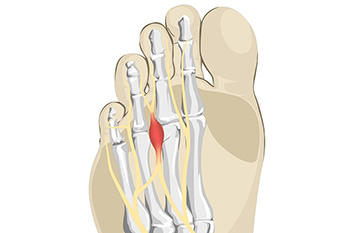6650 Frankford Ave
Philadelphia, PA 19135

Morton's neuroma is a painful condition affecting the nerves between the toes, most commonly the third and fourth toes. It involves a thickening of the tissue around one of the nerves leading to the toes, causing sharp, burning pain or a sensation of stepping on a pebble. This benign growth, also known as intermetatarsal neuroma, results from repeated stress or irritation, often due to activities that involve wearing tight shoes or high heels. The incidence of Morton's neuroma varies, affecting more women than men, and typically occurring between the ages of 30 to 50. It involves the interdigital nerves becoming compressed or irritated, leading to inflammation and discomfort. If you have pain between these toes, it is suggested that you seek counsel from a podiatrist who can accurately diagnose and treat Morton’s neuroma.
Morton’s neuroma is a very uncomfortable condition to live with. If you think you have Morton’s neuroma, contact John M. Fanelly, DPM of Northeast Philadelphia. Our doctor will attend to all of your foot care needs and answer any of your related questions.
Morton’s Neuroma
Morton's neuroma is a painful foot condition that commonly affects the areas between the second and third or third and fourth toe, although other areas of the foot are also susceptible. Morton’s neuroma is caused by an inflamed nerve in the foot that is being squeezed and aggravated by surrounding bones.
What Increases the Chances of Having Morton’s Neuroma?
Morton’s neuroma is a very treatable condition. Orthotics and shoe inserts can often be used to alleviate the pain on the forefront of the feet. In more severe cases, corticosteroids can also be prescribed. In order to figure out the best treatment for your neuroma, it’s recommended to seek the care of a podiatrist who can diagnose your condition and provide different treatment options.
If you have any questions, please feel free to contact our office located in Philadelphia, PA . We offer the newest diagnostic and treatment technologies for all your foot care needs.